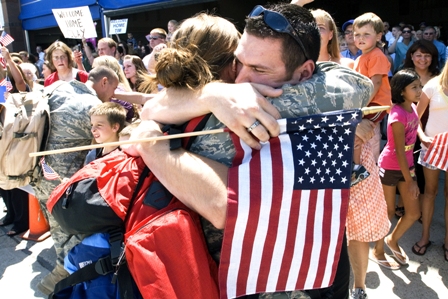Traumatized Female Vets Face Uphill Battle
Veterans Administration, Geared to Men, Shortchanges
Special Needs of Women
By SUSAN DONALDSON JAMES
March 2, 2010—
The first day Kristine Wise returned from eight months military service in Iraq, she knew something was
wrong. Driving from San Diego to Bakersfield to see her brother, the
road signs triggered flashbacks.
"One said 'railroad,' but instead I saw 'roadside' and in my mind a
roadside bomb," said Wise, who supplied parts to combat vehicles in the
first wave of the war. "I would see 'beware' and my mind would see
'Baghdad.' I couldn't explain it."
The depression and panic attacks began long before her honorable
discharge in 2004, but the battle to get the Department of Veterans
Affairs (VA) to take her symptoms seriously was just as difficult.
"They had a hard time comprehending I was a combat vet and didn't treat
me with the same respect," said Wise, now 40 and rated 10 percent
disabled for post traumatic stress disorder.
Wise is one of more than 230,000 women -- about 11 percent of the U.S.
military -- who have served in Iraq and Afghanistan.
As of the third quarter in 2009, the VA reported that 11,713 of the
women evaluated received a diagnosis of post traumatic stress disorder (PTSD).
Women have experienced the same psychological and emotional trauma as
their male counterparts, but the VA has only begun to pay attention to
their gender-specific needs, according to to "Combat to Community," a 2009 report conducted the
veterans' advocacy group, Swords to Plowshares.
The number of women in all branches of the military has doubled in the
last 30 years, and is expected to double again in the next decade, the
VA estimates.
Women are enrolling in VA healthcare at "historical rates," about 44
percent of all Iraq and Afghanistan war veterans, but say they
face roadblocks to good care.
"In case after case, Jack and Jill were both deployed and were in the
same fire fight," said Tia Christopher, a Navy veteran from Washington
state, who is being treated for PTSD caused by sexual assault.
"He's decorated and she's not because she's in support instead of in
combat," she said.
These veterans are also plagued with problems unique to their gender -- sexual harassment, guilt over leaving children
behind and a more difficult time transitioning back to civilian life,
according to Christopher, an associate for the Iraq Veterans Project.
They are younger than their male peers -- more than 66 percent of all
females seeking care are under 30, according to the VA. And some say
that exposure to war conditions can also compromise their reproductive
health.
Kristine Wise said she went into "out-of-control stress mode" shortly
after she arrived in Kuwait in 2003, where desert temperatures soared to
120 degrees and mortar fire hit several times a day.
Later, on convoys with combat troops in Baghdad, she witnessed repeated
rocket grenade attacks.
While stationed at the airport, 20 rounds of mortar fire hit a day. "I
can hear it in the air, like a whirling sound, whistling," she said.
Even today, she can't cope with California's summer heat. "It was so
intense over there and sometimes I panic," said Wise. "It's like a part
of my body is burning."
PTSD Hurdle Harder for Women
Because women technically service in combat support roles, it's harder
for them to substantiate claims of PTSD.
"They experience as much in combat," said Colleen Corliss, spokesman for
Swords
to Plowshares, which helps veterans transition back to their
communities.
"A male goes to fill out a claim to get treatment and he has 23 to 28
pages to fill out. For women there are additional steps, ridiculous red
tape for someone who is having severe symptoms focusing."
"Even sitting down in the clinic for awhile is traumatic," she said.
"Women have to identify a particular moment or instance that triggers
that type of emotions."
For the last two years, Congress has been pushing the VA to respond to
the special needs of women.
At least three bills call for larger studies on women who've served in
Afghanistan and Iraq to find out how war affects their physical, mental
and reproductive health, including one by Sen. Patty
Murray, D-Washington.
Combat-related stress is only part of the problem for women. In 2008,
the VA reported that 1 in 5 women screened were found to have military sexual trauma and 60 percent of them
develop post-traumatic stress.
Those who experience sexual abuse PTSD get a "double whammy," according to
Christopher, who testified before Congress last year.
She was assaulted in language school during Navy training after signing
up in 2000, but her assailant was found not guilty.
"I was raped in the barracks room," said Christopher. "My rapist raped
several other women -- that's why I came forward. During the whole
investigation and afterward, I had to live and work with him and they
kept me in the same barracks room where it happened. Then he began to
stalk me."
"I kept fighting it up the chain of command and it's my opinion they
tried to make an example of me," said Christopher, now 28. "They thought
it was a game -- that I was just making it up."
Christopher told Congress the male-dominated culture in VA facilities
makes it doubly hard for women who have been traumatized to feel
comfortable seeking treatment.
In most clinics, female veterans must share facilities with men -- even
those who have experienced sexual trauma.
When Christopher first went to the VA, she brought along note cards with
questions because she was so nervous about interacting with male
doctors.
"I'd have to walk through the halls with all men and get hassled," she
said.
Christopher said the VA has "come a long way," since she was honorably
discharged in 2002, but just a handful of mental health clinics serve
only women.
Today, she is doing well with a female therapist and credits the help
she eventually found within the VA. "I've had good and bad experiences,"
she said.
Soldier to Wife Transition Hard
Kayla Williams, who experienced "acute stress reaction" after serving
with the Army's
101st Airborne Division in Iraq, traces back her
anxiety to watching a man bleed to death while serving as an Arabic
translator during the initial invasion of Iraq in 2003.
Williams, now 33, chronicled her five years of service in the book, "Love My Rifle More Than You: Young and Female in the
U.S. Army."
Working alongside infantrymen on combat patrols, Williams was part of a
quick-reaction force that resulted in the death of one and 10 injured.
"I watched someone bleed to death and it was probably the most intense
and difficult day for me," she said.
"For several months after the experience and again when I came home I
had intrusive image of that day," said Williams. "I had trouble
sleeping and lost my temper easily and was startled by loud noises."
Those symptoms eventually faded, but coping with the transition from
soldier to civilian took a toll.
"I was also becoming the wife of a combat wounded veteran who was
struggling with cognitive and psychological injuries," she said.
"Instead of just worrying about my own challenges, I also had to try to
help him overcome his own."
When she first returned to Washington, D.C. in 2005, few services
catered to women veterans. "It would have been great if they could have
pointed me toward resources that would have helped me -- like
counseling," she said.
Williams also worries about the environmental effects of war. The couple
tried to conceive for two years without success.
"Most of us were exposed to burning trash and burning plastic, feces and
dead animals," she said. "Sometimes it's human medical waste. I am not
sure what combination of chemicals might have affected me, but I worried
about the burning plastic."
After several negative encounters with the VA, Williams eventually found
good care in a specialized women's unit in West Virginia. "Women should
be able to seek help in a community of their own peers," she said.
"By and large the VA does a pretty good job," said, who used the GI BIll
to go to graduate school and now works at defense-related think tank.
"But male and female disparities need to be addressed."
The VA, which serves 1.8 million females out of 8 million total
veterans, has said it has heard these women and has already set in place
a number of changes at its 153 hospitals and 783 outpatient clinics
across the country.
One important step was staffing every VA medical center with a women
veterans program manager and educating more doctors in female health.
""Now there is a national movement to raise the standard of
comprehensive care for women vets at all facilities," said Dr. Laura
Herrera, the VA's director of Women's Comprehensive Health.
"Unfortunately, we are the largest health care system in the country and
educating and providing resources is taking some time," she said. "But
we are moving in that direction."
Women Are 14 Percent of All Vets
Women returning from Afghanistan and Iraq are enrolling in the VA in
"record numbers," according to Herrera, for everything from primary and
reproductive care to mental health and brain injuries.
The VA is working "fast and furious" to provide specialized care for
women, she said, updating services that were established for women in
1988, when they represented only 4.4 percent of the veterans'
population.
"Getting people to think of women as part of military service is hard,"
said Herrera. "It is pervasive throughout the country and not just the
VA system. We are working hard to educate the American public the role
women service in the armed forces."
Recent initiatives include programs to provide comprehensive primary
care and enhanced mental health services for women and the create
better education programs in women's health for physicians. The VA is
also supporting a multifaceted research program on women's health.
The VA also cites its Center for Women Veterans as a resource.
Herrara said one priority was to create better outreach to help women
navigate the system.
"The care provided is some of the highest quality care in the country,
not just in the VA," she said. "People want to get home and don't listen
to the briefings. They don't necessarily know what the VA can do for
them and read stories that not so positive and they think they're not
going to get care. Many women are missing out on the superior care we
are providing for women."
As for Kristine Wise, who is now five years into readjustment counseling
at San Diego's
Veterans Center, she is now attending California State
University San Marcos, getting her tuition paid by the VA.
There, she is studying human development and hopes to one day work with
other female veterans, especially those deployed in war zones. Wise was
also able to receive two years of transitional housing from the VA.
Though she is still "hypervigilant," her PTSD symptoms are much
"milder."
"I've got the greatest counselor on earth," said Wise. "I can continue
school and now with the housing program I have a place to live and
continue school."
Her advice to other women veterans is to "get mental health help right
away."
"I sought it out and was not ashamed to get it," she said. "A lot of
women are ashamed because they are in the military and are supposed to
be tough. I just knew that I needed it and didn't want to suffer."
For information about available services contact the Department of Veterans
Affairs.
Those seeking support can contact "Swords
to Plowshares" for their list of national resources.
 A welcoming home for our Troops.
A welcoming home for our Troops.

